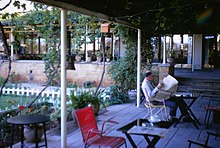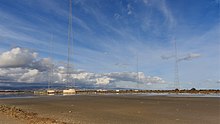Akrotiri and Dhekelia
[3][4] The Sovereign Base Areas were created in 1960 by the London and Zürich Agreements, when Cyprus achieved independence from the British Empire, as recorded by the United Nations in 1960 as treaty 5476.[5] The United Kingdom desired to retain sovereignty over these areas, as this guaranteed the use of UK military bases on Cyprus, including RAF Akrotiri, and a garrison of the British Army.In July and August 1961, there were a series of bomb attacks against the pipeline carrying fresh water to the Dhekelia Sovereign Base Area.[7] In the early 1970s the United States built an over-the-horizon radar named Cobra Shoe, which could observe airplane operations and missile tests in southern Russia.[11] The Turkish advance halted when it reached the edge of the Dhekelia Sovereign Base Area to avoid military conflict with the United Kingdom.[13] Some Greek Cypriot refugees remain housed on land in the parts of Trachoni[14] and Kolossi[15] villages that fall within the Akrotiri Sovereign Base Area.The basic philosophy of their administration was declared by the British government in Appendix O to the 1960 treaty with Cyprus, which provided that the British government intended:[5] Appendix O also provides that various ancient monuments in the SBAs (in particular the site and remains of Kourion, the Sanctuary of Apollo Hylates near Kourion, the Stadium of Curium and the Church and remains of the Holy Monastery of St Nicholas of the Cats) should be administered by the Republic of Cyprus.[30] The Court of the Sovereign Base Areas is concerned with non-military offences committed by any person within Akrotiri and Dhekelia, and law and order is maintained by the Sovereign Base Areas Police, while offences involving British Forces Cyprus and military law are dealt with by the Cyprus Joint Police Unit.On 15 December 2012 in a written statement to the House of Commons, the UK's Secretary of State for Defence, Philip Hammond, revealed the findings of a report on the SBA military bases following the completion of a review of their operations by Lord Ashcroft: The Sovereign Base areas are in a region of geo-political importance and high priority for the United Kingdom's long term national security interests ... Our military personnel, United Kingdom civilians and locally employed personnel in the Sovereign Base Areas make a major contribution to the national security of the United Kingdom and will continue to do so in the future.On 30 June 2005 the House of Representatives of Cyprus unanimously adopted a resolution on the legal status of the base areas originally proposed by Vassos Lyssarides.The resolution refers to "relevant UN decisions on the abolition of colonialism, as well as the fundamental principles of international law, which forbid the occupation of territory within the domain of any other country."[36] The Sovereign Base Areas Administration has carried out assessments and surveys into the effects on wildlife, which have fed into an "Akrotiri Peninsula Environmental Management Plan", published in September 2012.[37] In 2004, the UK offered to cede 117 square kilometres (45 sq mi) of farmland as part of the rejected Annan Plan for Cyprus.[citation needed] On 29 August 2013, during the Syrian civil war, some Cypriot and British media sources speculated that long-range ballistic missiles, fired from Syria in retaliation for proposed British involvement in military intervention against the Syrian government of Bashar al-Assad, could hit Cyprus, and could potentially deliver chemical weapons.[39] A spike in the US Air Force arms delivery from US and NATO depots in Europe to Akrotiri was reported by the Israeli newspaper Haaretz, and "the illegal presence of thousands of American soldiers" at the base have drawn criticism.Perhaps to help reduce any tensions in the area, outside of the bases much of the territory is indistinguishable from that controlled by Cyprus and casual visitors may not realize that they have crossed an international border.[44][45] In the exchange of notes establishing them the British government specifically stated that it would not "...create customs posts or other frontier barriers between the Sovereign Base Areas and the Republic.More than 150 species of birds, over half of conservation concern, have been trapped in nets, or on limesticks, and it is estimated that organised crime gangs earn over 15 million Euros yearly.[58][59] Employing measures such as covert camera surveillance (including a drone), exclusion zones and impounding vehicles, trapping activity at Dhekelia fell by 77.5%.[63] The designations were made under the Protection and Management of Nature and Wildlife Ordinance and will support the existing network (NATURA 2000) of SACs in Cyprus and across Europe.[citation needed] The Base Areas form part of the Republic of Cyprus telephone numbering plan, using the international prefix +357.Amateur radio direction finding identified RAF Akrotiri as the location of the powerful but now defunct shortwave numbers station "Lincolnshire Poacher".










Akrotiri (prehistoric city)TurkishBritish Overseas TerritoryGod Save the KingCyprusSovereign stateUnited KingdomTreaty of EstablishmentEpiskopi CantonmentAkrotiriEnglishGovernmentstratocraticdependencyconstitutional monarchyMonarchCharles IIIPeter Squiresex officioGovernment of the United KingdomMinisterStephen DoughtyPopulationnot rankedTime zoneDriving sidePostal codes in CyprusBritish military basesCrown colony of Cyprus1960 treaty of independenceGreeceTurkeysignals intelligenceMediterraneanMiddle EastHistory of Cyprus (1878–present)London and Zürich AgreementsBritish EmpireUnited NationsRAF AkrotiriBritish ArmySuez Canalover-the-horizon radarU.S. Air ForceCypriot National GuardTurkey invaded the north of CyprusTurkish Republic of Northern CyprusGreek Cypriotsnorthern CyprusGreek CypriotTrachoniKolossitroop demands in Northern IrelandLockheed U-2Akrotiri village's districtLimassol Salt LakeDhekelia CantonmentAyios NikolaosNo. 903 Expeditionary Air WingNo. 84 Squadron RAFPrincess of Wales's Royal RegimentThe RiflesAyios Nikolaos StationUKUSA AgreementECHELONBritish Overseas TerritoriesKourionHylatesBritish Ministry of DefenceAdministratorCommanderBritish Forces CyprusAir Vice-MarshalPeter J. M. SquiresBritish monarchColony of CyprusSovereign Base Areas PoliceGreat RecessionCameron–Clegg coalitionHouse of CommonsSecretary of State for DefencePhilip HammondLord AshcroftRepublic of CypruscolonialismHouse of Representatives of CyprusVassos Lyssaridesradio mastsUniversity of BristolAnnan Plan for CyprusSyrian civil warBashar al-AssadIoannis KasoulidesUS Air ForceHaaretzKeir StarmerceasefireIsraelDhekeliaRepublic of Northern CyprusEU-compliant national identity cardEuropean Union Customs UnionEU citizens2020 departure from the EUIrelandBrexit withdrawal agreementGeography of CyprusLimassolLarnacaUnited Nations (UN) buffer zonearea controlled by the Turkish forcesAyia NapaXylotympouOrmideiaDhekelia Power Stationaccording to the laws of the UNmigration flywaymillions of birds are killed yearlyBirdLife CypruslimesticksambelopouliaImportant Bird AreaRamsar Conventionferruginous duckblack-winged stiltKentish plover